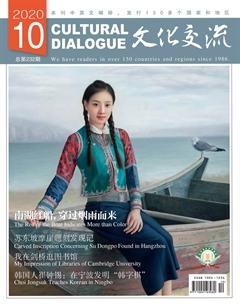韩国人崔钟锡:在宁波发明“韩字棋”
黄岚


“学中文难,还是学韩语难?当然是学中文难喽!中文可是号称天下最难学的语言!”当“忠涵交流”的崔钟锡老师用一口流利的普通话如是回答时,我与他都哈哈大笑。
显然,世上最难学的中文没有阻挡一颗坚定学中文的心。崔钟锡是韩国人,20世纪90年代初他在一家企业工作,因工作关系需要学习中文,他就开始在公司的内部培训班上学起了中文。
说到那时的学习,真是很辛苦,白天工作,晚上学中文。说到学中文的难,崔钟锡说字的发音不算难,难的是四种声调。越学下去,一字多音、一字多义越让人犯难,当然最难的是文字背后蕴含的中国文化。一个字,不仅仅是一个字,其字义凝聚了文化传承。这在四字成语中反映最明显。学中文,更要学中国历史。
当崔钟锡意识到,就他自己来说边工作边学习已经不能学好中文时,便毅然辞工,进大学选了中文专业进行系统学习。可想而知,崔钟锡是付出了多少汗水,才换来今天这“中国通”的赞誉。
我很奇怪,中国东西南北城市这么多,为什么偏偏选择了浙江宁波呢?宁波,简称甬,又称明州,是国家历史文化名城。原来1997年时,他老家顺天市与宁波市结成友好城市,当时宁波市有访问团去,他就做了翻译。顺天市属全罗南道。全罗南道,在韩国的最南端,隔海与济州岛相望,1998年与浙江省正式建立友好省道关系。两地高层互访频繁,文化、教育、青少年等各领域的交流较为活跃。渐渐地,他对浙江省和宁波市就熟悉起来。读研究生时,崔钟锡特意选了中国宁波历史这个课程,毕业论文《高丽文宗时期对宋使行路变更与其交流》,研究的正是北宋时明州发达的海运与高丽的密切关系。
机缘巧合的是,2006年宁波市有一个教育访问团到访顺天市,时有宁波外事学校的领导邀请他来宁波任教。深深的宁波情结,让他放下年幼的女儿和深爱妻子,来到宁波外事学校开了首个韩文课程班。任教一年后,崔钟锡回韩国教中文去了,毕竟女儿需要爸爸的爱。
2008年春节,他收到了这第一届学生的大礼包——学生们拍了个视频说:“老师,我们想你了。”这又触动了崔钟锡的心。这一年,崔钟锡作为韩国顺天市政府的中文翻译随团访问宁波,并特意到宁波外事学校看望韩语班的学生和学校的老师们。看到熟悉的校园和可爱的学生,他当即作出决定:放弃在韩国的工作,再次回来担任该班的韩语教师。这一次他说服了同为中文专业的妻子,带上女儿,一起来到宁波,目前妻子也在寧波外事学校教授韩文。这回真正扎根了,崔钟锡自豪地说:“我是新宁波人。”
我好奇地问:那你到宁波后住得惯、吃得惯吗?“吃海鲜呀!顺天市靠海,宁波也靠海,都是太平洋的海鲜呢,当然吃得惯!”说到对宁波的喜爱,崔钟锡不吝赞语。宁波有白居易笔下“江南好,风景旧曾谙”的江南风光,有与时俱进的国际海港的泱泱大气,更有古老的图书馆——他喜欢的宁波天一阁,这个全亚洲最古老的藏书楼。天一阁附近月湖边的高丽使馆遗址,也是崔钟锡挂念的地方。北宋政和七年(1117年)在明州(宁波古称)建造了高丽使馆,供高丽使节居住,这是当时江南唯一的高丽使馆,是明州对外交往和中国与高丽友好往来的历史见证。
宁波外事学校的韩文班,从无到有到现在已形成规模,崔钟锡称得上是个拓荒者。崔钟锡夫妻俩为此付出了巨大的精力,并相继获得了宁波市政府颁发的宁波茶花友谊奖。茶花是宁波市的市花,茶花奖是宁波市政府为表彰对宁波市经济建设和社会发展作出突出贡献的外籍友人而设立的奖项。
崔钟锡的事业,也在逐步成长,他的梦想是出书和促进中韩文化交流。从备课制订教学计划,到探索教学方法,十多年的耕耘,换来了梦想成真的一天,这几年他相继出版了两本助学韩语书籍,分别是:《崔老师韩语口语课堂·生活篇》《韩语魔鬼训练》。
不但出书了,2013年,崔钟锡还与他的第一届学生一起创办了忠涵交流公司,旨在培训韩语。更为难得的是,他发明了“韩字棋”这一助学韩文的工具,现已获得中国国家知识产权局颁发的专利证书。
韩字棋是一种帮助韩语学习者们积累韩语词汇、提高韩语运用能力的益智类游戏。韩字棋由棋盘、棋子以及排列板三部分组成,棋子有红蓝两色各40枚和白色20枚组成,40枚棋子上各印有韩语中的19个辅音字母和21个元音字母。20枚白棋中有基本辅音14枚,基本元音6枚,都是组韩字时最常用的字母,因为有了白棋,更容易组成字和词,所以赛前要根据对手的水平先约定放多少枚。游戏时,两人各执一色,在棋盘中比拼字,谁拼成一个词,谁就把这面上的棋子吃掉,把对方颜色的棋子放入本人一侧的排列板上,在规定时间内谁吃掉对方棋子多谁就获胜。这个游戏的关键是拼单词,谁熟记的单词越多,获胜的机会的就越大。
崔钟锡说起这个游戏的创意时不无感慨地说,我在教学过程中发现,学生要记住记熟单词有难度,单单背诵又很枯燥,所以受到成语接龙游戏的启发,用字母拼词以“玩游戏”的方式来记单词,不仅效果好,而且学生们也感到非常好玩,乐趣无穷。
韩字棋一经发明,很快受到韩语学习者的喜欢,《宁波晚报》等媒体也进行了相关报道。
当然有了宁波新家,不能忘了顺天老家。崔钟锡说,我要让更多的宁波人知道顺天市,要让更多的顺天人知道宁波市。崔钟锡除了为政府交流团、企业承担翻译工作外,还利用寒暑假时间,组织学生文化交流团到对方城市进行参观访问、文化交流,住到结对学校的学生家里,体验感受对方国家的文化气氛、风俗习惯。因为学习韩语最好的方式是找一个韩国朋友,通过结对方式,宁波的学生有了练口语的小伙伴,学起来会更加得心应手。
眼看着梦想在宁波一个接一个地实现,崔钟锡说的终极梦想越来越近了。我好奇崔老师在宁波的终极梦想是什么,他说:“我打算以后在我的第二故乡浙江宁波建立中韩文化交流中心,一个能提供韩国人和中国人互相学习、体验对方国家文化的平台。”
那就让我们共同期待崔钟锡老师的梦想早日实现吧。
Choi Jongsuk from the Republic of Korea has been teaching the Korean language in Ningbo, a harbor city in eastern Zhejiang, for more than 10 years. He speaks Chinese fluently.
In the 1990s, he worked in a business in South Korea and he began to learn Chinese at a training course in the company where he worked as his job was associated with China. He worked very hard to master the language. Very soon, he realized that he wouldnt be able to make fast enough progress if he continued to work and study at the same time. He resigned and took a university course to study Chinese.
His choice of Ningbo as a second home was not an accident at all. In 1997, his home city Suncheon, South Korea and Ningbo of Zhejiang, China partnered up as sister cities. A delegation from Ningbo visited Suncheon and Choi served as an interpreter in the reception of the Chinese delegation. In 1998, Jeollanam-do and Zhejiang Province became sister provinces. Mutual exchange programs in culture, education and youth increased rapidly. Frequently engaged in interpreting, Choi soon acquired a working knowledge of Zhejiang in general and Ningbo in particular. In his postgraduate studies, he took a special course about the history of Ningbo. His postgraduate paper was about the thriving shipping industry of Mingzhou (present-day Ningbo) during the Northern Song Dynasty (960-1127) and about the strong ties between Ningbo and Korea.
In 2006, Choi interpreted for an education delegation from Ningbo. One of the delegation members was the president of Ningbo Foreign Affairs School. The president offered Choi a teaching job at the school. Choi accepted the job offer and worked at the school for a year. After the contract expired, he went back home. During the Spring Festival of 2008, he received a video clip from the students he had taught a year. In the video the students said, “We miss you” to Choi. The Korean was touched. In 2008, he visited Ningbo as an interpreter for a government delegation of Suncheon. He found time to visit the school again. Seeing students and teachers there, Choi made up his mind to teach Korean there. This time, he came back with his wife and daughter. The family settled down in Ningbo.
Life in Ningbo isnt difficult for the family. After all, Suncheon is a coastal city where seafood is abundant, just like Ningbo. The city also offers Choi something very close and historical. There is the site of the Guesthouse for Koreans first built in 1117 during the Northern Song Dynasty for envoys from the Korean Peninsula.
The Korean language course at the Ningbo Foreign Affairs School is now a popular brand in Ningbo. Choi and his wife, also a teacher of Korean, have contributed to the success of the course. The husband and wife respectively have won Camellia Prize, a special honor issued by the Ningbo Municipal Peoples Government to international friends for their outstanding contribution to the citys economic and social development.

